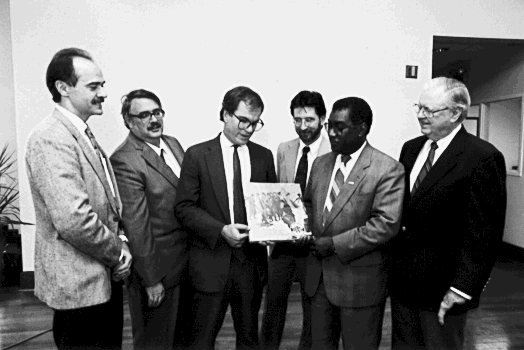Center for Popular
Music


|
Mission Statement
|
|
The mission of the Center for Popular Music at Middle Tennessee
State University is to
foster research and scholarship in American popular music, and to
promote an awareness
of and appreciation for America's diverse musical culture.
To carry out this mission the center:
- Maintains an extensive archive and library that serves as a
regional and national resource.
- Disseminates scholarship via publications, lectures and media
productions.
- Stages public programs that introduce and interpret various
aspects of American vernacular music.
|
Goals and Objectives
|
|
- To provide a research resource that will serve the needs of the
regional, national and international scholarly community as well as
those of MTSU students and faculty.
- To study and promote understanding of the ways in which various
genres of popular music, and the cultures from which they arise,
relate to each other.
- To study and promote understanding of the development of
popular music through time.
- To study and promote understanding of the ways in which
community-based oral traditions and mass marketed commercial musics
relate to each other.
|
Introduction
|
| Popular music studies are among the
most rapidly growing areas of contemporary music
scholarship. Popular music topics figure prominently at conferences
and in professional
journals of ethnomusicology, folklore, musicology, American
studies, popular culture,
sociology and communications disciplines. The center's position
within the university,
reporting to the university Provost/Vice President for Academic
Affairs, reflects this
multi-disciplinary approach to popular music studies.
The collections and programs of the center focus on the importance
of music as an aspect
of culture rather than as fine art. The center embraces a broad
concept of popular music,
encompassing both contemporary and historical musics, and including
various forms of
vernacular religious music as well as secular traditions. The
center also recognizes the
importance of the interplay between community-based oral traditions
and commercial
realms, and acknowledges the contributions of various regional and
ethnic traditions in
shaping the mainstream of popular music.
Much of 20th century popular music has its roots in southern oral
traditions, making
Tennessee a marvelous laboratory for the study of popular music.
Ragtime, jazz, blues,
Anglo- and African-American folk musics, country, gospel and rock
have all flourished
across the state and have contributed greatly to mainstream popular
music. The music
business has long constituted an important segment of Tennessee's
economy. |
Archive and Library
|
| The heart of the center's operations
is its archive and library. Beginning in November
1985, with no research materials at all, the center's collection
has evolved into a large and
complex resource that is now recognized as one of the leading
popular music collections
in existence. It has been described as "the preeminent music
collection in the South" and
as "a worldclass archive." |
|  CIVIL WAR MUSIC - Time-Life Music
president John Hall, presents The Civil War Music Collector's
Edition to MTSU President James E. Walker. The set, produced by the
center, was promoted nationally to 500,000 Civil War enthusiasts.
From left are Paul Wells, center director and set co-producer;
Charles Wolfe, MTSU English professor and set annotator; Hall:
Bruce Nemerov, center audio specialist and set coproducer; Walker;
and Rep. John Bragg, Murfreesboro. |
| The collection includes music in
various commercial forms such as sheet music, sound
recordings, song books, broadsides and related materials necessary
to study popular
music in all its cultural, social, historical, musical and
commercial contexts. It contains
over 11,500 books and scores including more than 4,000 rare books;
82,000 sound
recordings in formats from cylinders to compact discs; 55,000
pieces of sheet music including
over 3,300 song broadsides; 1,200 periodical titles; and extensive
holdings of trade
catalogs, photos, posters, manuscripts, news clippings and related
materials. Members of
the center staff engage in field documentation of music via audio
recording and photography,
resulting in the creation of much unique material for the center's
archive.
The center's sheet music collection, the largest in the South,
includes material from the
late 18th century to the present. It also includes the Kenneth S.
Goldstein Collection of
American Song Broadsides, the only significant collection of song
broadsides in the
South. Other aspects of the center's holdings focus on rock and its
roots, vernacular
religious music, popular instruments and music of the
South. |
Users of the Center for Popular
Music
|
| The center's collection serves
2,000-3,000 researchers annually. In addition to MTSU
students and faculty, researchers have come from nearly every state
in the nation and
approximately a dozen foreign countries. Center clientele includes
scholars in North
America, Europe, Asia, Australia and Africa; trade and university
presses; the music
industry; state agencies; museum personnel; and public radio and
television producers. |
Programs, Publications and
Services
|
| The center has produced over 20
lectures, conferences and seminars bringing leading
American popular music scholars to MTSU. The most successful
programs have combined
a lecture or seminar about a particular type of music with
performances by leading
artists. Such well-attended events have included South African and
African-American
vocal traditions (1990), Louisiana Cajun music (1993) and
fingerstyle guitar(1995).
The center maintains a fully equipped audio laboratory that serves
the preservation needs
of the center and provides services to radio producers, state
agencies, record companies
and individuals. Center staff has consulted with historic sites and
museums on the presentation
and interpretation of period music. A substantial outcome of this
research direction
was the 1991 production for Time-Life Music of The Civil War Music
Collector's
Edition, a three-CD set featuring recordings of material from the
center's collection, and
performances and arrangements based on comprehensive historical
research. |
Conclusion
|
| The Center for Popular Music has
quickly become one of the leading music research
centers in the country. Its broad-based archive continues to give
music scholars in the
region a resource rivaling major libraries of the North and West;
center programs enrich
audiences throughout the region; and center publications receive
national and interna-
tional distribution. Continued growth of the research collection
and exciting new projects
point to a promising future for the Center for Popular Music at
MTSU.
|


|

